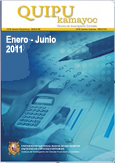THERE POTENTIAL OF SERVICE RATE - WILL?
DOI:
https://doi.org/10.15381/quipu.v18i35.3628Keywords:
Especies tributarias, contribución y tasa, propiedad privada, código tributario.Abstract
The dialectic of the tribute or contradiction in its abstract essence, could be formulated as follows: the tax presupposes private property, because only the owner may be taxed as real estate, personal property or of indefinite assets expressed in paper money is that the subject of "taxable event" but at the same time, it puts into question (and of course, limits and cuts in practice) the very core of private property, through which the institution of the tax exists and may continue exist. This reflection, developed at the philosophical level, we can perceive that the institution called the tribute is also of interest to those who move in this complex area. In our country, the Consolidated Text of the Tax Code, approved by Supreme Decree N º 135-99-EF (published on August 19 of 1,999) chose the tripartite classification for purposes of developing the concept of species tax is so, according to Rule II of the introduction acknowledges, Tax, Tax and Rate. The latter is subdivided into: Means, Rights and Licenses.
Downloads
Downloads
Published
Issue
Section
License
Copyright (c) 2011 Teodoro Castro Contreras

This work is licensed under a Creative Commons Attribution-NonCommercial-ShareAlike 4.0 International License.
AUTHORS RETAIN THEIR RIGHTS:
a. Authors retain their trade mark rights and patent, and also on any process or procedure described in the article.
b. Authors retain their right to share, copy, distribute, perform and publicly communicate their article (eg, to place their article in an institutional repository or publish it in a book), with an acknowledgment of its initial publication in Quipukamayoc .
c. Authors retain theirs right to make a subsequent publication of their work, to use the article or any part thereof (eg a compilation of his papers, lecture notes, thesis, or a book), always indicating the source of publication (the originator of the work, journal, volume, number and date).






